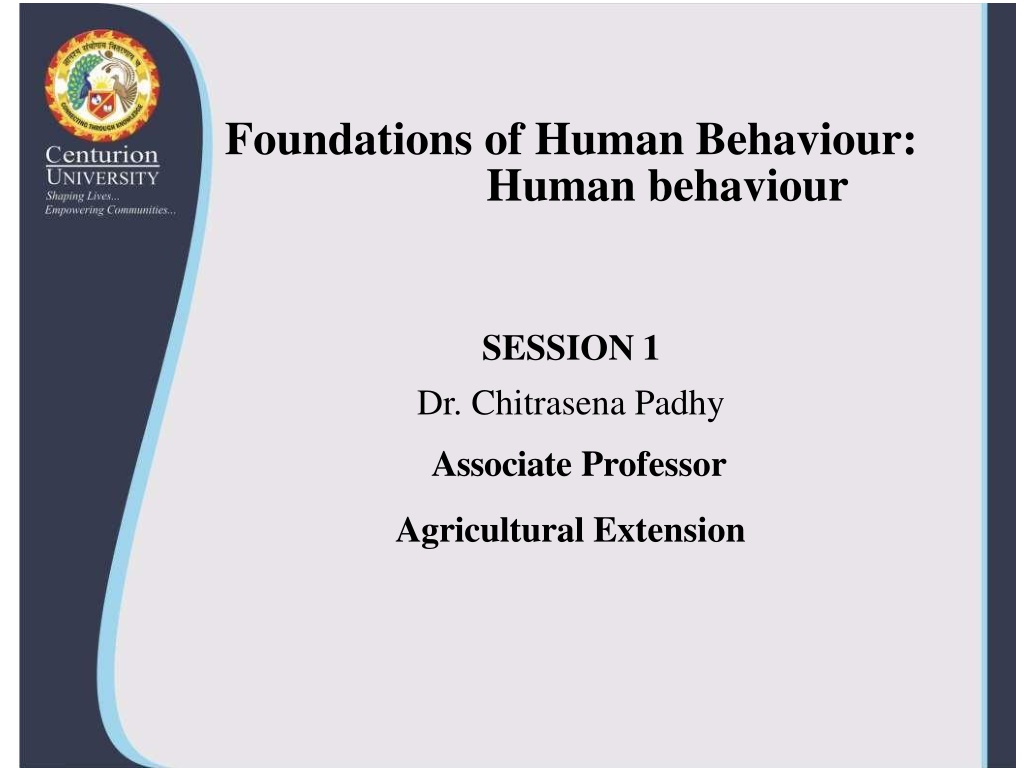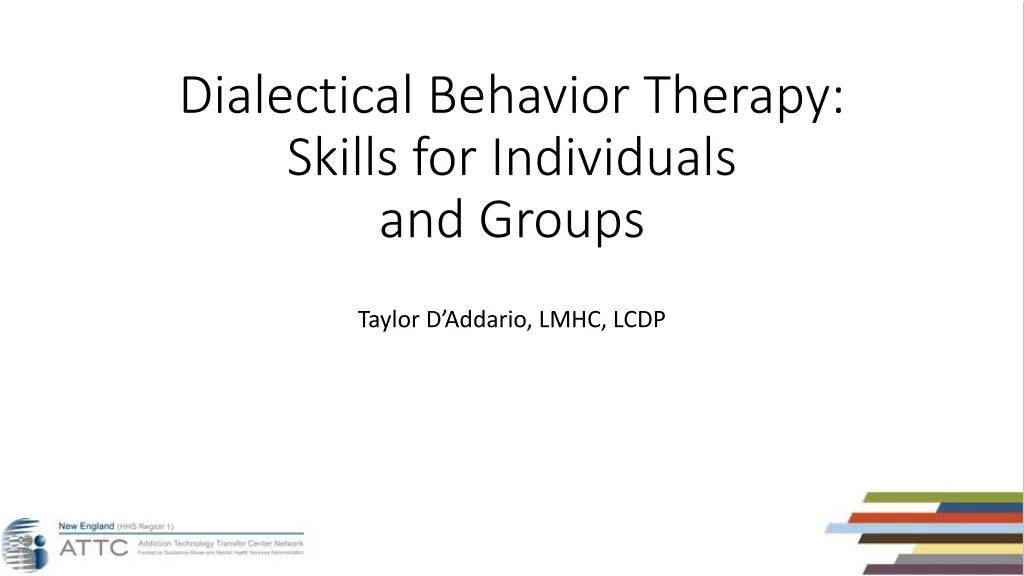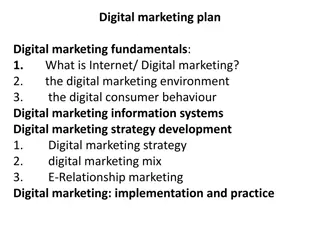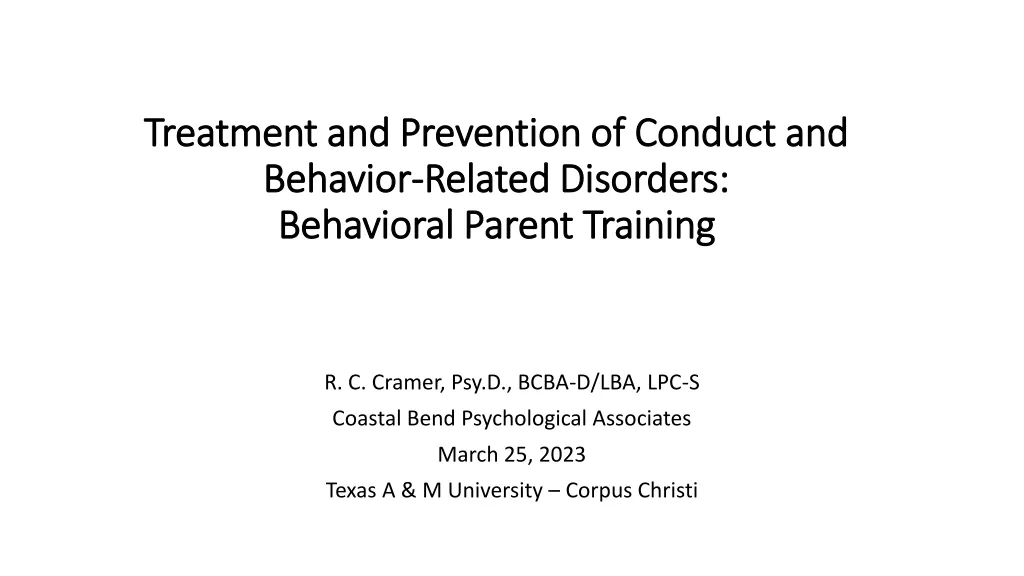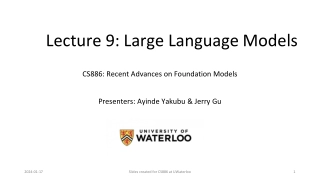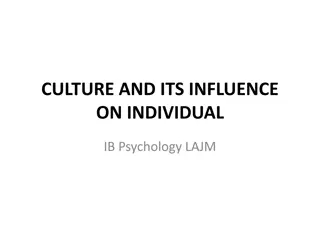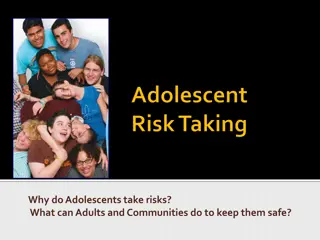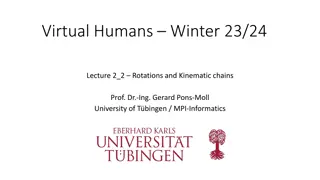Understanding Human Behavior: Foundations and Complexity
Human behavior encompasses the actions and interactions of individuals influenced by factors like genetics, culture, and situational contexts. It involves observable overt behaviors as well as hidden covert behaviors, with a dynamic interplay between individuals and their environments. Psychologists study behavior through the lenses of actions, cognition, and emotions, reflecting the intricate nature of human behavior in various contexts.
Download Presentation
Please find below an Image/Link to download the presentation.
The content on the website is provided AS IS for your information and personal use only. It may not be sold, licensed, or shared on other websites without obtaining consent from the author. Download presentation by click this link. If you encounter any issues during the download, it is possible that the publisher has removed the file from their server.
Presentation Transcript
Foundations of Human Behaviour: Human behaviour SESSION 1 Dr. Chitrasena Padhy Associate Professor Agricultural Extension
Human Behaviour Human behaviour refers to the way humans act and interact. It is based on and influenced by several factors, such as genetic make-up, culture and individual values and attitudes. Potential and expressed capacity for physical, mental, and social activity during the phases of human life.
Behavior can be defined as the actions or reactions of a person in response to external or internal stimulus situation. Psychology is a science of activity of people which lead to an understanding of nature of behavior. Behavior is always the product of two things, one- the nature of individual or organism that behaves and second- the nature of situation in which the individual find himself.
According to Crowder Behavior is any activity which can be observed, recorded and measured, this includes first what living beings or organisms do- that is their movement in space . Psychologists analyze behavior from two point of view- Overt & Covert, the behavior that is visible and what occurs outside of human being is called overt behavior. Example- playing football and eating something are overt behavior.
The behavior that is not visible and what occurs inside of human being is called covert behavior. Example- thinking. Psychologist Luine express behavior through an equation as B= (P x E) =Function, P=Person, E=Environment. where, B= Behavior,
Behavior is a function of people and environment. Environment creates stimulus situation, it is human nature to respond stimulus situation. Human behaviour, the potential and expressed capacity for physical, mental, and social activity during the phases of human life. Humans show same types of behaviour as other animals. But human behaviour is often more complex because we are more intelligent and aware of ourselves.
Human behavior is an inherently complex subject matter which pertains to the manner and reasons behind people s actions. In scientific research, human behavior is a complex interplay of three components: actions, cognition, and emotions.
Actions An action denotes everything that can be observed, either with bare eyes or measured by physiological sensors. Think of an action as an initiation or transition from one state to another at a movie set, the director shouts action for the next scene to be filmed. Behavioral actions can take place on various time scales, muscular activation to sweat gland activity, food consumption, or sleep. ranging from
Cognitions Cognitions describe thoughts and mental images you carry with you, and they can be both verbal and nonverbal. I have to remember to buy groceries, or I d be curious to know what she thinks of me, can be considered verbal cognitions. In contrast, imagining how your house will look like after remodeling could be considered a nonverbal cognition.
Cognitions knowledge knowing how to use tools in a meaningful manner (without hurting yourself), sing karaoke songs or being able to memorize the color of Marty McFly s jacket in Back to the Future (it s red). comprise skills and
Emotions Commonly, an emotion is any relatively brief conscious experience characterized by intense mental activity, and a feeling that is not characterized as resulting from either reasoning or knowledge. This usually exists on a scale, from positive (pleasurable) (unpleasant). to negative
Other aspects of physiology that are indicative of emotional processing such as increased heart rate or respiration rate caused by increased arousal are usually hidden to the eye. action = emotion (joy) + cognition
Actions, cognitions and emotions do not run independently of each other their proper interaction enables you to perceive the world around you, listen to your inner wishes and respond appropriately to people in your surroundings. However, it is hard to tell what exactly is cause and effect turning your head (action) and seeing a familiar face might cause a sudden burst of joy (emotion) accompanied by an internal realization (cognition):
The sequence of cause and effect might be reversed: Because you re sad (emotion) and ruminating on relationship issues (cognition), you decide to go for a walk to clear your head (action). emotion (sadness) + cognition ( I should go for a walk ) = action
Our environment, recognize everyone and everything, learn new knowledge, and ironically, we really don t know how much of our brains work. However, modern neuropsychology have made significant strides in explaining the impact our minds have on our daily tasks. This is why Psychology feels intriguing and thought-provoking to many brains help us interpret the neuroscience and
The term psychology has been derived from the Greek word psyche translating as breath, spirit, soul and logia that corresponds to studyof . Human behaviour includes everything we do. Anything we say(Verbal behaviour). Our facial expressions Body gestures
Human behavior refers to the range of behaviors exhibited by humans and which are influenced by culture, attitudes, emotions, values, rapport, hypnosis, persuasion, coercion and/or genetics. The behavior of people falls within a range with some common, some acceptable, and some outside acceptable limits ethics, authority, behavior unusual, being some
What factors can affect behaviour? Physical factors - age, health, illness, pain, influence of a substance or medication personal and emotional factors - personality, beliefs, expectations, emotions, mental health life experiences - family, culture, friends, life events what the person needs and wants.
Behaviour is also affected by the context, including: what is happening at the time the environment - heat, light, noise, privacy the response of other people, which is affected by their own physical factors, personal and emotional factors, life experiences, wants and needs.
